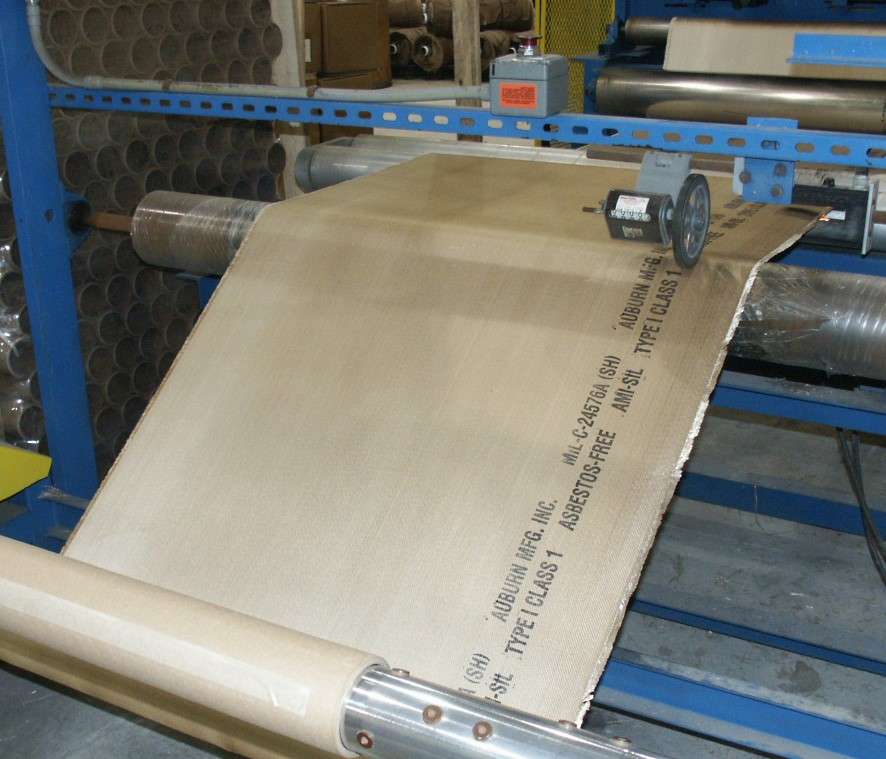
Mechanic Falls-based manufacturer wins 2nd unfair trade suit against China
 PHOTO / TIM GREENWAY
CEO Kathie Leonard of Auburn Manufacturing Inc., at the company’s manufacturing site in Mechanics Falls won a second unfair trade suit against silica fabrics from China.
PHOTO / TIM GREENWAY
CEO Kathie Leonard of Auburn Manufacturing Inc., at the company’s manufacturing site in Mechanics Falls won a second unfair trade suit against silica fabrics from China.
In 2016, Kathie Leonard, CEO and president of Auburn Manufacturing Inc. in Mechanic Falls, took on China in a trade lawsuit that challenged subsidized products dumped on the U.S. market — and she won.
Leonard took on China again in a similar suit filed in 2021 — and recently learned she won again.
In the recent decision, the U.S. Department of Commerce determined that China engaged in unfair trade practices that negatively affected Auburn Manufacturing.
The department instructed U.S. Customs and Border Protection officials to collect cash deposits from the Chinese producers named in the investigation as payment for duties owed on heat-resistant materials similar to those made by Auburn Manufacturing.
“It’s like a detective story,” Leonard told Mainebiz of the complicated proceedings.
Auburn Manufacturing is a leading producer of advanced fire- and heat-resistant materials. Its textiles are used as protection from extreme high heat by the defense industrial base as well as other critical industries like primary metals, power generation and aerospace.
First lawsuit
The first lawsuit centered on a flood of low-cost silica fabric coming to the U.S. from China that was used to make amorphous silica fabric.
At first, Leonard wasn’t worried. Early on, she has previously told Mainebiz, the branding and presentation of the Chinese product were poor. But over time, they improved, and U.S. companies formed to funnel the Chinese fabric into the market as American-made. In three years, Auburn Manufacturing lost 30% of its silica business.

With representation from a Washington, D.C., law firm, in January 2016, Auburn Manufacturing filed a petition with the U.S. Department of Commerce and the U.S. International Trade Commission requesting imposition of anti-dumping and countervailing duties on the Chinese fabric. In February 2017, the ITC voted in favor of Auburn Manufacturing. Chinese companies would still be allowed to export to the United States, but at great expense, with duties of up to 300%.
Second lawsuit
But the problem didn’t go away, Leonard said this week.
Instead, she said, China began exporting top-quality silica fabric but branding it as lower-cost mid-silica fabric, thereby avoiding the higher duties.
“We had a hard time getting any of this mid-silica fabric,” she said. “But we came to believe that it really is the first-quality fabric and that they just call it mid-silica so they don’t have to pay the duty.”
Auburn Manufacturing’s fabric is 96% pure silica and can take nearly double the temperature of mid-silica fabric that is composed of 70% to 90% silica, she said.
Auburn Manufacturing realized its products were being undercut when customers stopped buying from the Mechanic Falls company in the name of getting a lower-cost mid-quality fabric that was branded as being just as good as the top-quality fabric, Leonard said.
Doing the detective work, Leonard theorized that the Chinese export was actually the top-quality fabric but was being sold at a lower cost in order to avoid higher duties.
“We went to the Department of Commerce and filed a petition, asking them to look into it,” she said. “They did and they agreed with us, based on the evidence that they could gather.”
According to the determination by the Enforcement and Compliance Agency of the International Trade Administration, Chinese manufacturers of amorphous silica fabrics have indeed engaged in circumventing the antidumping and countervailing duty orders in place since 2017.
As a result, the new U.S. Department of Commerce decision took a harder stance. It instructed U.S. Customs and Border Protection to suspend entries of 70% to 90% amorphous silica fabrics from China and require cash deposits as surety against potential duties on unliquidated imports.
“Our business is very good right now,” said Leonard, who was a 2018 Mainebiz Leader of the Year. “I think the timing was right to do this. But we want to remain vigilant about this going forward.”
She added, “Auburn Manufacturing’s hard-working team applauds the Commerce Department’s heightened scrutiny of the ASF products being subsidized by the Chinese government and dumped in the United States.”














0 Comments